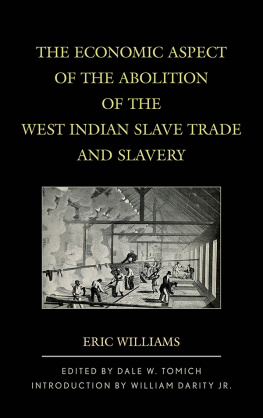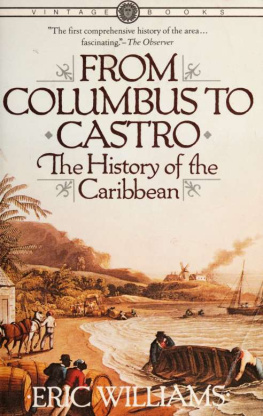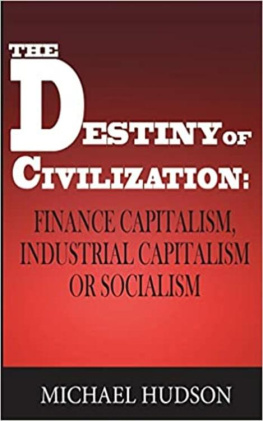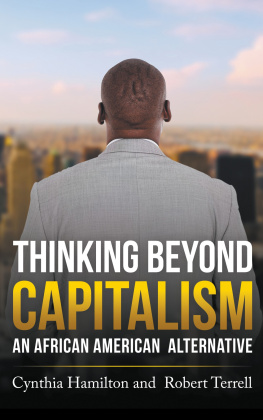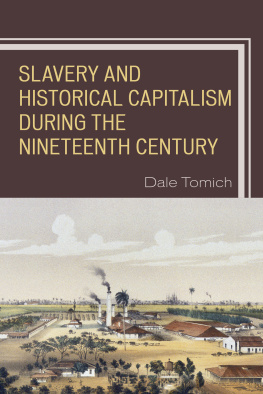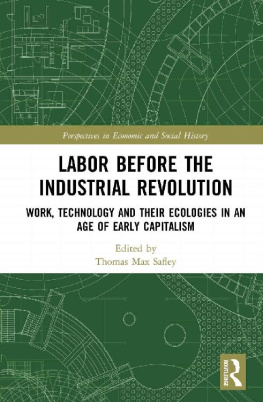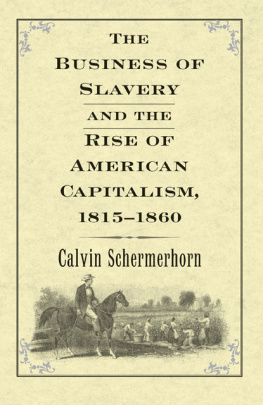The paper in this book meets the guidelines for permanence and durability of the Committee on Production Guidelines for Book Longevity of the Council on Library Resources.
PREFACE
The Present Study is an attempt to place in historical perspective the relationship between early capitalism as exemplified by Great Britain, and the Negro slave trade, Negro slavery and the general colonial trade of the seventeenth and eighteenth centuries. Every age rewrites history, but particularly ours, which has been forced by events to reevaluate our conceptions of history and economic and political development. The progress of the Industrial Revolution has been treated more or less adequately in many books both learned and popular, and its lessons are fairly well established in the consciousness of the educated class in general and of those people in particular who are responsible for the creation and guidance of informed opinion. On the other hand, while material has been accumulated and books have been written about the period which preceded the Industrial Revolution, the world-wide and interrelated nature of the commerce of that period, its direct effect upon the development of the Industrial Revolution, and the heritage which it has left even upon the civilization of today have not anywhere been placed in compact and yet comprehensive perspective. This study is an attempt to do so, without, however, failing to give indications of the economic origin of well-known social, political, and even intellectual currents.
The book, however, is not an essay in ideas or interpretation. It is strictly an economic study of the role of Negro slavery and the slave trade in providing the capital which financed the Industrial Revolution in England and of mature industrial capitalism in destroying the slave system. It is therefore first a study in English economic history and second in West Indian and Negro history. It is not a study of the institution of slavery but of the contribution of slavery to the development of British capitalism.
Many debts must be acknowledged. The staffs of the following institutions were very kind and helpful to me: British Museum; Public Record Office; India Office Library; West India Committee; Rhodes House Library, Oxford; Bank of England Record Office; the British Anti-Slavery and Aborigines Protection Society; Friends House, London; John Rylands Library, Manchester; Central Library, Manchester; Public Library, Liverpool; Wilberforce Museum, Hull; Library of Congress; Biblioteca Nacional, Havana; Sociedad Econmica de Amigos del Pas, Havana. I wish to thank the Newberry Library, Chicago, for its kindness in making it possible for me, through an inter-library loan with Founders Library, Howard University, to see Sir Charles Whitworths valuable statistics on State of the Trade of Great Britain in its imports and exports, progressively from the year 16971773.
My research has been facilitated by grants from different sources: the Trinidad Government, which extended an original scholarship; Oxford University, which awarded me two Senior Studentships; the Beit Fund for the study of British Colonial History, which made two grants; and the Julius Rosenwald Foundation, which awarded me fellowships in 1940 and 1942. Professor Lowell J. Ragatz of George Washington University in this city, Professor Frank W. Pitman of Pomona College, Claremont, California, and Professor Melville J. Herskovits of Northwestern University, very kindly read the manuscript and made many suggestions. So did my senior colleague at Howard University, Professor Charles Burch. Dr. Vincent Harlow, now Rhodes Professor of Imperial History in the University of London, supervised my doctoral dissertation at Oxford and was always very helpful. Finally, my wife was of great assistance to me in taking my notes and typing the manuscript.
Eric Williams
Howard University
Washington, D.C.
September 12, 1943
INTRODUCTION
Colin A. Palmer
Few Modern Historical works have enjoyed the enduring intellectual impact and appeal of Eric Williamss Capitalism and Slavery. Its publication in 1944 was greeted by acclaim in some quarters and severe criticism in others. The scholarly debate over its conclusions continues fifty years later with no sign of abating. This classic work by a West Indian scholar remains the most provocative contribution to the study of the complex relationship between the African slave trade, slavery, the rise of British capitalism, and the emancipation of the slave population in the West Indies.
Eric Eustace Williams was born in Trinidad in 1911. An intellectually gifted young man, he attended Queens Royal College, one of the best secondary schools on the island. In 1931 he was awarded the lone Island Scholarship and in 1932 enrolled at Oxford University, where he read for a degree in modern history. At Oxford, as in Trinidad, Williams was exposed to intellectual currents that celebrated the imperial connection and gave little agency to the peoples of African descent in the colonies. Recalling his formative years in Trinidad, Williams noted, The intellectual equipment with which I was endowed by the Trinidad school system had two principal characteristics quantitatively it was rich; qualitatively it was British. Be British was the slogan not only of the Legislature but also of the school.
As he grew intellectually at Oxford, the young colonial came to question, and ultimately reject, an imperial-centered analysis of his peoples history. In his meetings with his tutor, R. Trevor Davies, for example, Williams reported that he consistently took an independent line.The Economic Aspects of the Abolition of the West Indian Slave Trade and Slavery, would be revised, expanded, and published five years later.
Williams accepted a teaching appointment at Howard University in 1939. There, he continued his research, elaborating on his dissertation and placing special emphasis on the relationship between slavery and the rise of British capitalism. Williams also established contact with Professors Lowell Ragatz of George Washington University and Frank Pitman of Pomona College. The two scholars were leading authorities on the pre-emancipation history of the British West Indies.
Acting upon the advice of Ragatz, Williams submitted his completed manuscript to the University of North Carolina Press on February 17, 1943. In his letter to William T. Couch, the director, the author wrote that he hoped the book lives up to the high standards of your Press as much as it would seem to fit in with the general run of works on Negro Slavery which the intellectual world has learned to associate with the University of North Carolina. He noted that the manuscript had been read by Pitman and Ragatz and that his research had been supported by two Rosenwald Fellowships that he received in 194041 and in 1942.
Williamss letter was accompanied by a one-page prospectus describing the book and its principal thesis. The book, he said, attempts to place in historical perspective the relation between early capitalism in Europe, as exemplified by Great Britain, and the Negro slave trade and Negro slavery in the West Indies. It shows how the commercial capitalism of the eighteenth century was built up on slavery and monopoly, while the Industrial capitalism of the nineteenth century destroyed slavery and monopoly. He stressed that the West Indian colonies are put in a general colonial framework and that British West Indian development is seen always in relation to the development of other Caribbean areas, e.g., Cuba and St. Domingue, as well as other sugar producing areas, Brazil and India. Williams emphasized that he saw the humanitarian movement not, as is customary, as something abstract, but as essentially a part of the age and the general economic struggle against slavery and monopoly.



